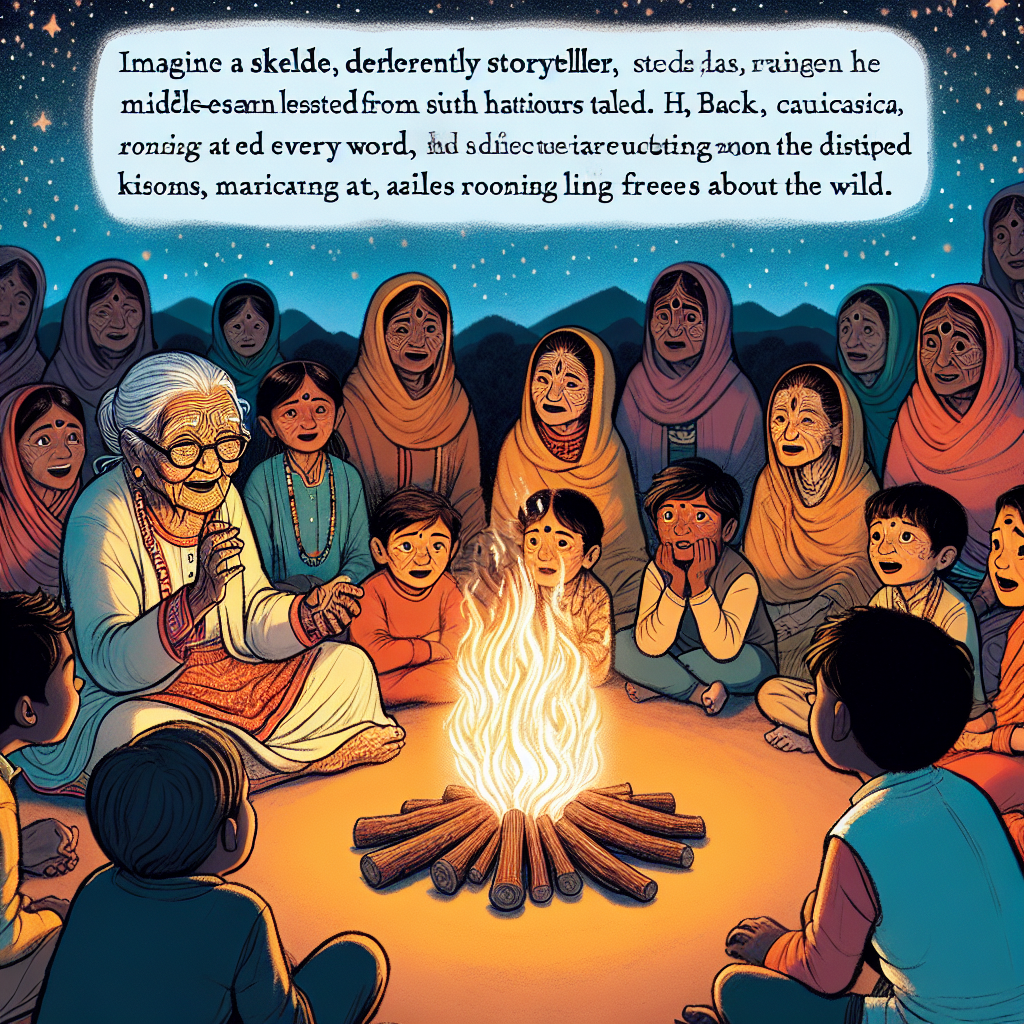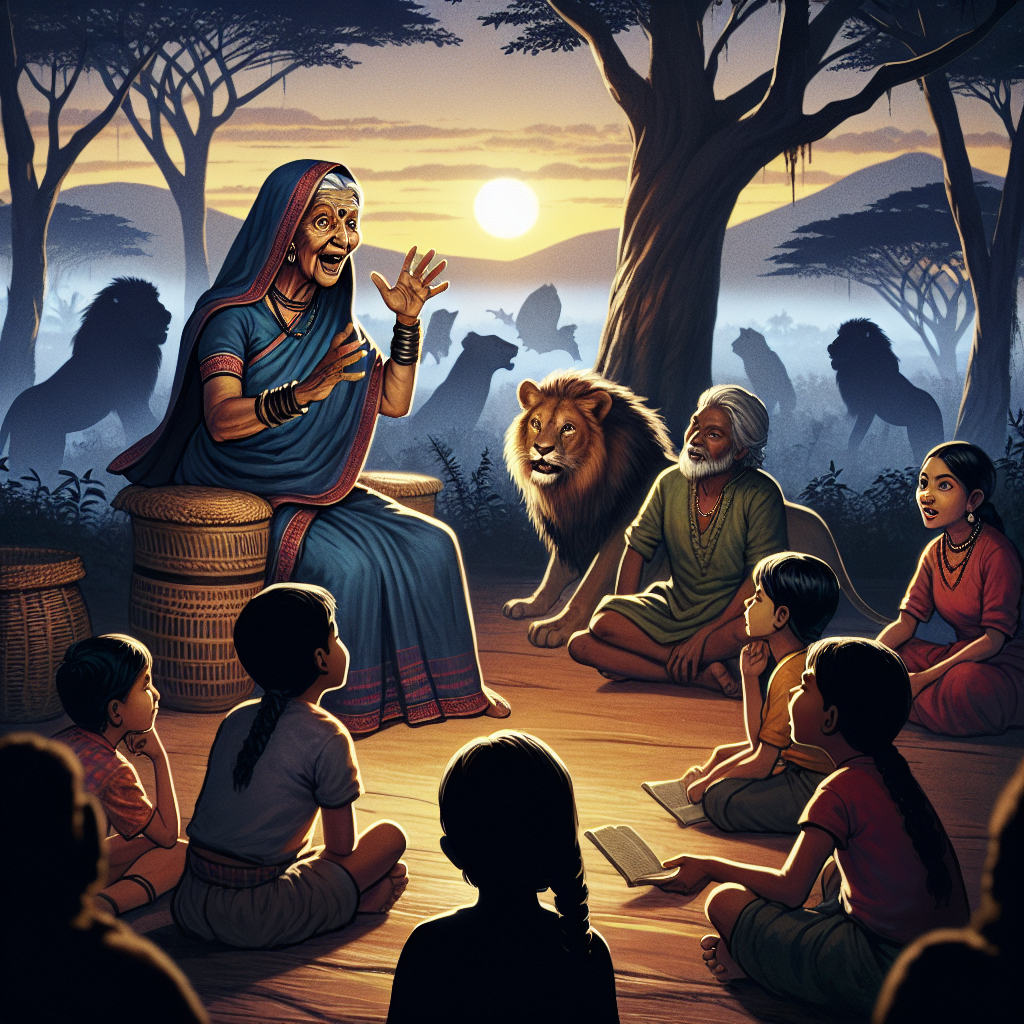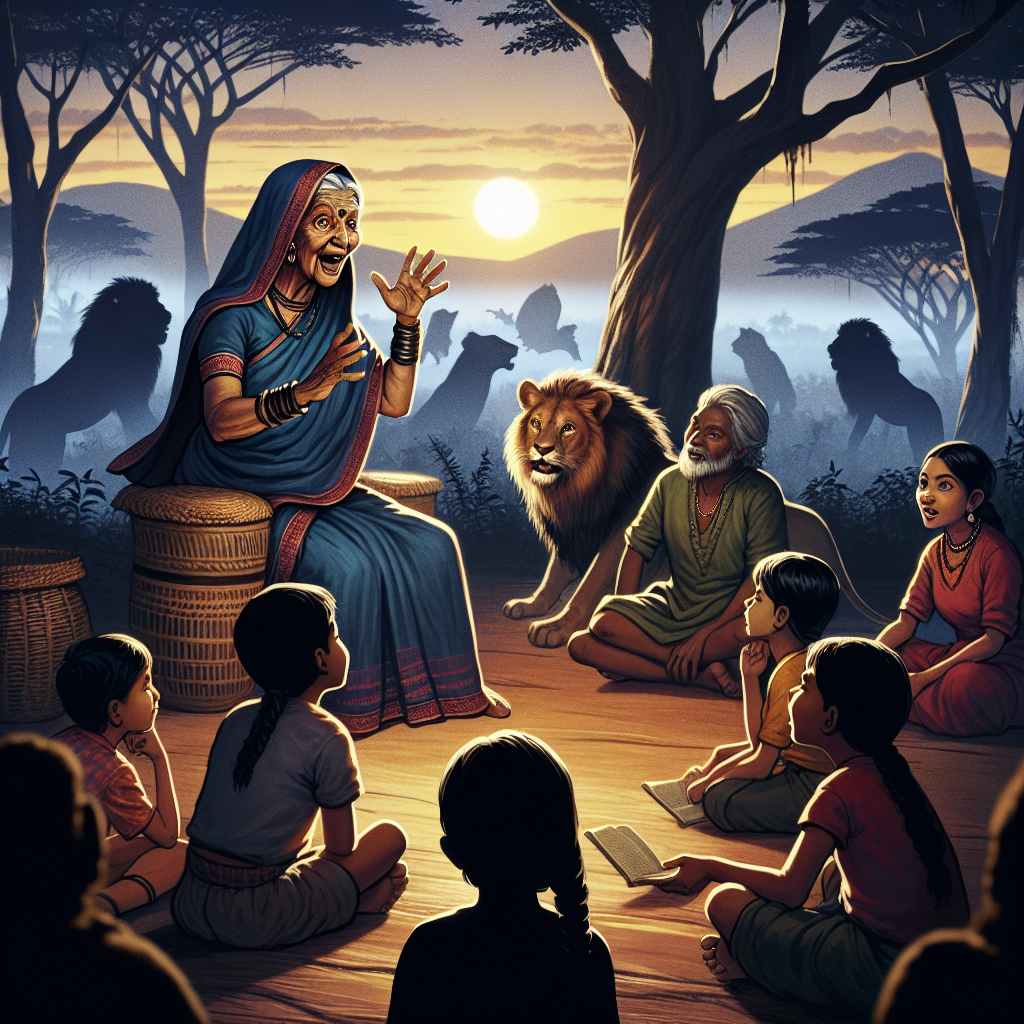Imagine yourself sitting around a flickering campfire, surrounded by a community of eager listeners. The night sky is filled with stars, and the air is thick with anticipation as the storyteller begins to weave a tale. This is the magic of community storytelling, a traditional practice that has been passed down through generations. In this article, we will explore the fascinating world of oral traditions and how they play a vital role in preserving lion lore. From mesmerizing tales of mighty hunters to ancient myths and legends, these stories not only entertain but also serve as a vital link to our shared cultural heritage. So, grab a seat and prepare to be transported to a world where myths come alive and the spirit of the lion roams freely. Welcome to the enchanting realm of community storytelling and the preservation of lion lore.
Overview of Lion Lore
Lion Lore refers to the rich tapestry of stories, traditions, and beliefs surrounding lions that have been passed down through generations by oral tradition. These tales provide a window into the ancient origins of human civilization and offer valuable insights into the relationships between humans and these majestic creatures. Lion Lore is a vibrant part of cultural heritage in many societies, representing a fascinating blend of history, symbolism, and mythology.
Ancient Origins
The roots of Lion Lore can be traced back to ancient civilizations, where lions held great significance in religious and cultural practices. In Egypt, for example, lions were associated with the goddess Sekhmet, the lioness-headed deity of war and protection. In ancient Mesopotamia, the lion was seen as a powerful symbol of courage and strength, often depicted in artwork and sculptures.
Types of Lion Lore
Lion Lore encompasses a wide range of narratives and traditions across cultures. These stories can vary from folklore and myths to moral tales and legends. Some common themes that emerge from Lion Lore include the symbolism of the lion as the “King of the Jungle,” the lion-human relationships depicted in these narratives, and the mythology surrounding these majestic creatures. Each culture brings its own unique perspective and interpretations to Lion Lore.
Importance of Oral Traditions
Preserving Cultural Heritage
Oral traditions play a crucial role in preserving cultural heritage, and Lion Lore is no exception. Through storytelling and narrative transmission, societies have been able to keep their traditions alive for centuries. Oral traditions allow for the transfer of knowledge, customs, and values from one generation to the next, ensuring the continuity of cultural heritage.
Transmitting Knowledge and Wisdom
Lion Lore acts as a repository of valuable knowledge and wisdom accumulated over generations. These oral traditions transmit information about the natural world, human-animal interactions, and the complexities of social structures. The stories of lion encounters passed down orally provide insights into survival strategies, hunting techniques, and the behavior of these majestic creatures, offering valuable lessons to those who listen.
Building Stronger Communities
Oral traditions strengthen the bonds within communities by providing shared narratives and experiences. Lion Lore serves as a cultural glue that connects community members, fostering a collective identity and sense of belonging. This shared heritage encourages collaboration, empathy, and a deeper understanding of one’s roots, creating stronger and more resilient communities.

How Lion Lore is Passed Down
Role of Storytellers
Storytellers are the custodians of Lion Lore, entrusted with the task of passing down these narratives through the generations. These skilled individuals captivate their audience with their compelling storytelling techniques, using their voice, gestures, and expressions to bring the stories to life. They hold a special place in their communities, as the storyteller’s role goes beyond entertaining – they are the torchbearers of cultural knowledge.
Evolution of Oral Tradition
Oral traditions have undergone evolution and adaptation over time, adjusting to the changing needs and contexts of society. While originally passed down solely through oral means, Lion Lore has found new avenues for dissemination with the advent of writing and technology. However, the essence of oral tradition remains, as the stories are often told aloud, ensuring the continuation of this ancient practice.
Rituals and Ceremonies
Rituals and ceremonies play a significant role in the preservation of Lion Lore. Many of these stories are intertwined with cultural practices and are performed during festivals, initiation ceremonies, or other important occasions. This integration of storytelling with rituals and ceremonies not only strengthens the oral tradition but also adds a layer of sacredness and reverence to the narratives.
Themes in Lion Lore
The King of the Jungle
In Lion Lore, the lion is often portrayed as the “King of the Jungle,” symbolizing power, dominance, and courage. This theme is prevalent in various cultures, where lions are associated with leadership, royalty, and authority. These stories reflect the human fascination with these incredible creatures and their ability to command respect and awe.
Symbolism and Mythology
Lion Lore is steeped in symbolism and mythology, providing insights into the collective imagination and beliefs of different cultures. The lion’s attributes, such as strength, bravery, and loyalty, are often associated with virtues that humans strive to embody. These symbolic representations help to instill cultural values and offer guidance for navigating the complexities of life.
Lion-Human Relationships
Lion Lore frequently explores the dynamic relationship between humans and lions. These narratives depict encounters between humans and these apex predators, highlighting the interconnectedness of the natural and human worlds. The stories showcase the profound interactions between the two species, acknowledging both the fear and respect that humans have for lions.

Variations of Lion Lore
Regional Differences
Lion Lore varies across different regions, reflecting the specific cultural contexts, landscapes, and traditions of each area. In Africa, where lions are native, the stories often center around indigenous tribes and their deep spiritual connection to these majestic creatures. In contrast, Western interpretations of Lion Lore may focus more on symbolism and mythology.
Ethnic and Tribal Perspectives
Within regions, Lion Lore can differ among different ethnic groups and tribes. Each group brings its own unique perspective and interpretations, showcasing the diverse ways in which lion symbolism and mythology are understood. These variations contribute to a rich tapestry of narratives, revealing the multiplicity of human experiences and perspectives.
Influence of Western Culture
With increased globalization and the influence of Western culture, Lion Lore has also seen some adaptations and modifications. In some cases, traditional stories have been reshaped to fit into Western literary traditions or have become commercialized for mass consumption. While this evolution allows for the continuation of Lion Lore in new forms, it also raises questions about cultural authenticity and the preservation of indigenous voices.
The Power of Storytelling
Captivating an Audience
Storytelling has an innate power to captivate and engage an audience, transcending age, language, and cultural barriers. The oral tradition of Lion Lore taps into this power, immersing listeners in vivid tales that transport them to distant lands and times. Through the storyteller’s compelling narrative skills, the audience can visualize and experience the world of lions.
Emotional Connection
Lion Lore evokes powerful emotions within the listeners, creating a deep sense of connection to the stories being told. The triumphs and struggles of the protagonists, the beauty of the natural world, and the lessons embedded within the narratives all elicit a range of emotions, from joy and wonder to sadness and reflection. These emotional connections foster empathy, compassion, and a deeper appreciation for the natural world.
Education and Entertainment
Lion Lore blends education and entertainment seamlessly, offering a way to educate and inspire through compelling storytelling. Listeners not only gain knowledge about lions and the natural world but also learn valuable life lessons, cultural values, and ethics. The educational aspect of Lion Lore helps to shape individuals’ understanding of their environment and encourages stewardship of the natural world.
Preserving Lion Lore in the Digital Age
Challenges of Modernization
The rise of the digital age presents challenges to the preservation of oral traditions such as Lion Lore. As traditional modes of storytelling and transmission evolve, there is a risk of losing the authenticity and integrity of these narratives. The allure of modern distractions and the shift towards written and visual mediums may divert attention from the oral traditions that have been integral to Lion Lore’s survival.
Digital Archiving
One way to preserve Lion Lore in the digital age is through digital archiving initiatives. By capturing audio and video recordings of storytelling sessions, these initiatives ensure that the stories are documented and accessible for future generations. Digital archiving enables wider dissemination of Lion Lore and allows for the preservation of the unique nuances and cultural contexts associated with each narrative.
Crowdsourcing and Collaborative Documentation
The digital era presents opportunities for crowdsourcing and collaborative documentation of Lion Lore. Online platforms and social networks provide spaces for community members to share their stories and experiences, creating a collective repository of Lion Lore. These networks facilitate collaboration and dialogue between storytellers and audiences, ensuring the continuation and enrichment of oral traditions.
The Impact of Lion Lore on Conservation
Promoting Wildlife Conservation
Lion Lore has the power to inspire and promote wildlife conservation efforts. These tales convey the beauty and importance of lions in the ecosystem, encouraging listeners to develop a sense of responsibility towards preserving these majestic animals and their habitats. By highlighting the significance of these creatures in cultural heritage, Lion Lore instills a reverence for nature that can lead to conservation action.
Fostering Environmental Awareness
Through the lens of Lion Lore, listeners gain a deeper understanding of the intricate relationship between humans and the natural world. These stories accentuate the interdependence between ecosystems and the profound impact that humans have on the environment. By raising awareness about environmental issues, Lion Lore encourages individuals to make sustainable choices and contribute to the protection of the planet.
Empowering Local Communities
Lion Lore empowers local communities by honoring their link to the natural world and fostering a sense of agency in conservation efforts. By showcasing the wisdom and traditional knowledge encapsulated in these narratives, Lion Lore reinforces the vital role that indigenous and local communities play in environmental stewardship. It recognizes their expertise and the importance of including them in conservation decision-making processes.
Revitalizing Oral Traditions
Integrating Oral and Written Traditions
Revitalizing oral traditions involves finding a balance between oral and written forms of transmission. While written records contribute to the preservation and accessibility of Lion Lore, the oral tradition should not be overlooked or replaced entirely. Integrating storytelling with written resources ensures the continuation of oral traditions while providing a broader platform for dissemination and engagement.
Youth Involvement and Education
Engaging the younger generation is essential for the revitalization of oral traditions, including Lion Lore. By incorporating these narratives into educational curricula, workshops, and community events, young people have the opportunity to connect with their cultural heritage. Encouraging youth involvement not only ensures the transmission of oral traditions but also helps instill a sense of pride and belonging in their cultural identity.
Supporting Indigenous Voices
Revitalizing oral traditions requires acknowledging and supporting the voices of indigenous communities. By providing platforms and resources, these communities can reclaim ownership over their narratives and share their rich heritage with the world. Cultural exchange and collaboration between indigenous and non-indigenous communities foster mutual understanding and respect, contributing to the preservation of Lion Lore.
Future of Lion Lore
Adaptation to Changing Times
As society continues to change and evolve, so too will Lion Lore. Adaptation is crucial to ensure the preservation and relevance of these oral traditions in the future. Lion Lore will continue to reflect the experiences and perspectives of different cultures, incorporating contemporary themes and challenges faced by human societies and the natural world.
Preserving Intangible Heritage
Lion Lore represents an intangible cultural heritage that is deeply rooted in the collective memory of communities. Preserving this intangible heritage requires ongoing efforts and collaboration between cultural organizations, communities, and individuals. Documenting, archiving, and safeguarding Lion Lore ensures its transmission and accessibility for generations to come.
Continuity and Innovation
The future of Lion Lore lies in striking a balance between continuity and innovation. While honoring the authenticity and traditional practices of oral tradition, there is also room for new modes of storytelling and dissemination. Embracing innovative technologies, multimedia platforms, and interactive experiences can breathe new life into Lion Lore, attracting diverse audiences and ensuring its continuation in a rapidly changing world.
In conclusion, Lion Lore is a testament to the power of oral traditions in preserving cultural heritage, transmitting knowledge and wisdom, and building stronger communities. While facing challenges in the digital age, Lion Lore can be preserved through digital archiving, crowdsourcing, and collaborative documentation. Its impact on conservation and revitalization of oral traditions is paramount, promoting wildlife conservation, fostering environmental awareness, and empowering local communities. The future of Lion Lore lies in its adaptation to changing times, preserving intangible heritage, and embracing continuity with innovation. By safeguarding and revitalizing Lion Lore, we can ensure that these rich narratives continue to captivate, educate, and inspire future generations.

